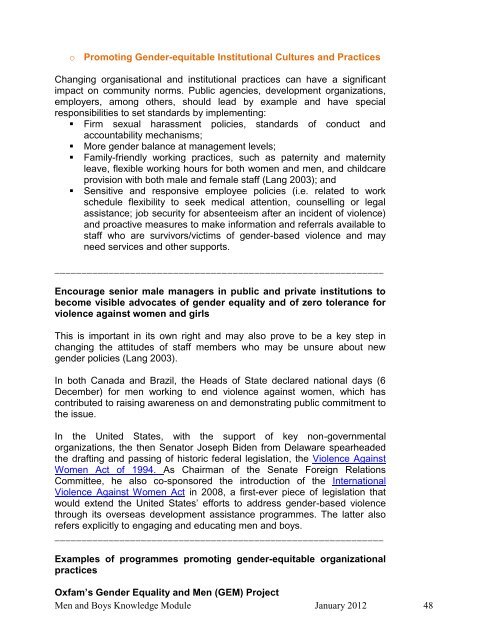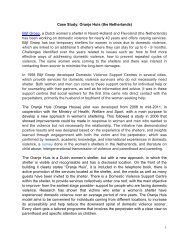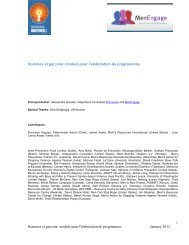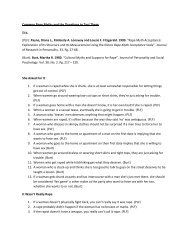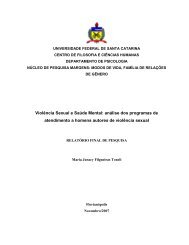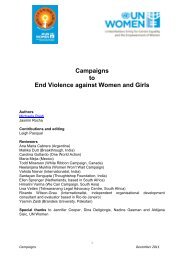Download PDF - Virtual Knowledge Centre to End Violence against ...
Download PDF - Virtual Knowledge Centre to End Violence against ...
Download PDF - Virtual Knowledge Centre to End Violence against ...
Create successful ePaper yourself
Turn your PDF publications into a flip-book with our unique Google optimized e-Paper software.
o Promoting Gender-equitable Institutional Cultures and Practices<br />
Changing organisational and institutional practices can have a significant<br />
impact on community norms. Public agencies, development organizations,<br />
employers, among others, should lead by example and have special<br />
responsibilities <strong>to</strong> set standards by implementing:<br />
� Firm sexual harassment policies, standards of conduct and<br />
accountability mechanisms;<br />
� More gender balance at management levels;<br />
� Family-friendly working practices, such as paternity and maternity<br />
leave, flexible working hours for both women and men, and childcare<br />
provision with both male and female staff (Lang 2003); and<br />
� Sensitive and responsive employee policies (i.e. related <strong>to</strong> work<br />
schedule flexibility <strong>to</strong> seek medical attention, counselling or legal<br />
assistance; job security for absenteeism after an incident of violence)<br />
and proactive measures <strong>to</strong> make information and referrals available <strong>to</strong><br />
staff who are survivors/victims of gender-based violence and may<br />
need services and other supports.<br />
_____________________________________________________________<br />
Encourage senior male managers in public and private institutions <strong>to</strong><br />
become visible advocates of gender equality and of zero <strong>to</strong>lerance for<br />
violence <strong>against</strong> women and girls<br />
This is important in its own right and may also prove <strong>to</strong> be a key step in<br />
changing the attitudes of staff members who may be unsure about new<br />
gender policies (Lang 2003).<br />
In both Canada and Brazil, the Heads of State declared national days (6<br />
December) for men working <strong>to</strong> end violence <strong>against</strong> women, which has<br />
contributed <strong>to</strong> raising awareness on and demonstrating public commitment <strong>to</strong><br />
the issue.<br />
In the United States, with the support of key non-governmental<br />
organizations, the then Sena<strong>to</strong>r Joseph Biden from Delaware spearheaded<br />
the drafting and passing of his<strong>to</strong>ric federal legislation, the <strong>Violence</strong> Against<br />
Women Act of 1994. As Chairman of the Senate Foreign Relations<br />
Committee, he also co-sponsored the introduction of the International<br />
<strong>Violence</strong> Against Women Act in 2008, a first-ever piece of legislation that<br />
would extend the United States‟ efforts <strong>to</strong> address gender-based violence<br />
through its overseas development assistance programmes. The latter also<br />
refers explicitly <strong>to</strong> engaging and educating men and boys.<br />
_____________________________________________________________<br />
Examples of programmes promoting gender-equitable organizational<br />
practices<br />
Oxfam‟s Gender Equality and Men (GEM) Project<br />
Men and Boys <strong>Knowledge</strong> Module January 2012 48


